
LOADING ...
In response to evolving domestic opinion, eMedals Inc has made the conscious decision to remove the presentation of German Third Reich historical artifacts from our online catalogue. For three decades, eMedals Inc has made an effort to preserve history in all its forms. As historians and researchers, we have managed sensitive articles and materials with the greatest of care and respect for their past and present social context. We acknowledge the growing sentiments put forth by the Canadian public and have taken proactive actions to address this opinion.
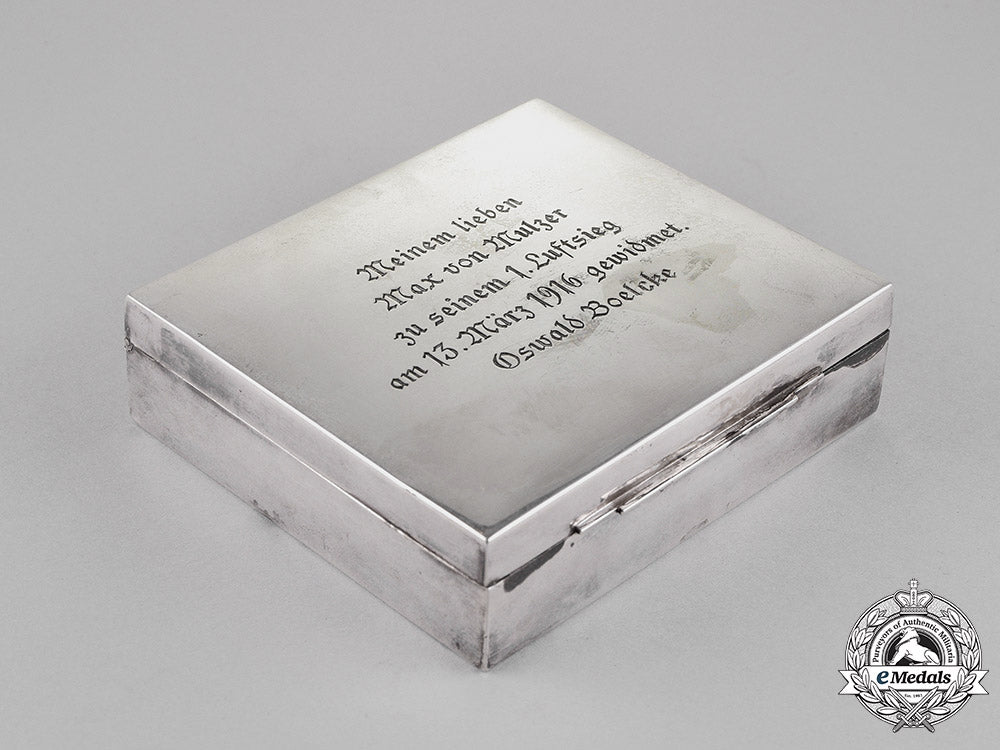
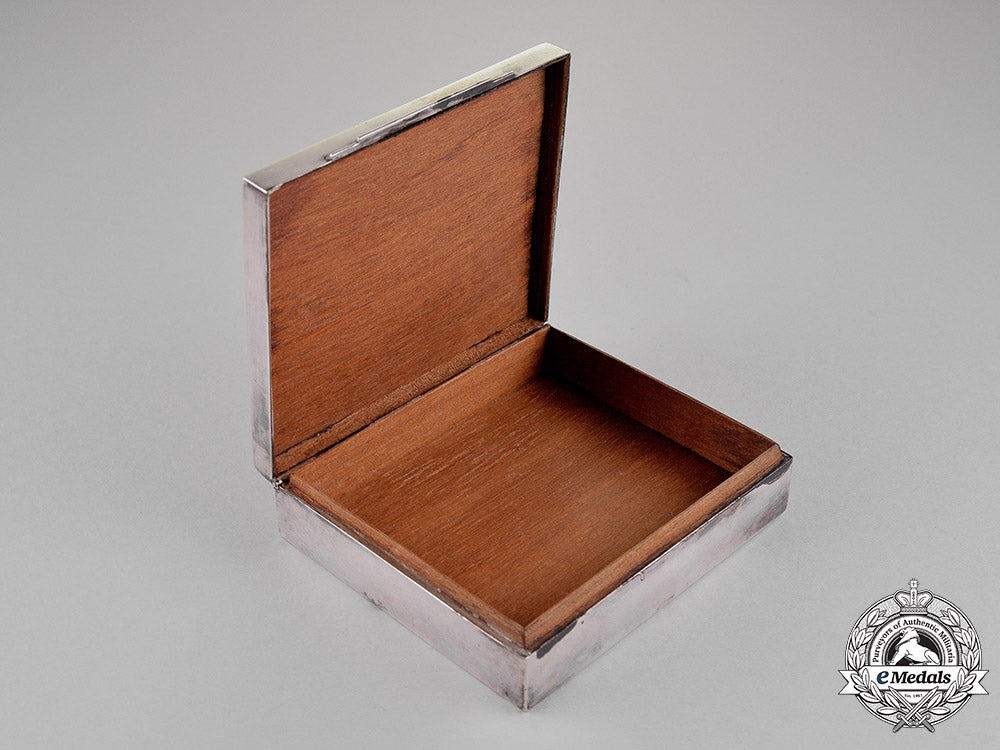
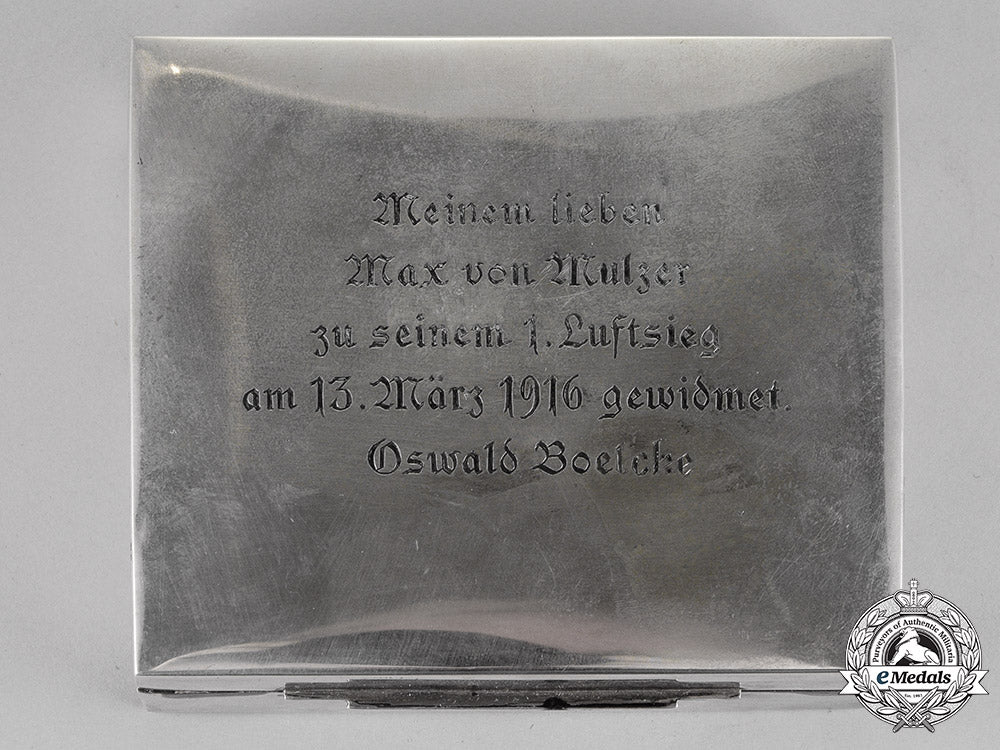
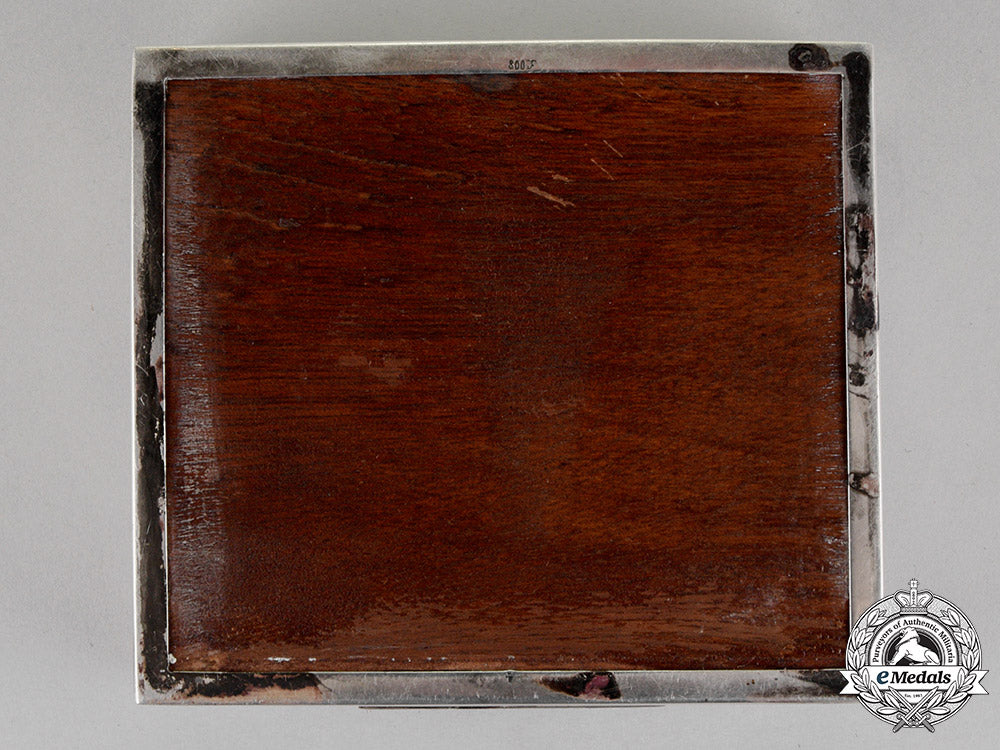
Germany. A Cigarette Case To Max V. Mulzer For His First Aerial Victory From Oswald Boelcke; Plm Winners
Germany. A Cigarette Case To Max V. Mulzer For His First Aerial Victory From Oswald Boelcke; Plm Winners
SKU: ITEM: G35673
Current Bid:
Your Max Bid:
Bid History:
Time Remaining:
Couldn't load pickup availability
Shipping Details
Shipping Details
eMedals offers rapid domestic and international shipping. Orders received prior to 12:00pm (EST) will be shipped on the same business day.* Orders placed on Canadian Federal holidays will be dispatched the subsequent business day. Courier tracking numbers are provided for all shipments. All items purchased from eMedals can be returned for a full monetary refund or merchandise credit, providing the criteria presented in our Terms & Conditions are met. *Please note that the addition of a COA may impact dispatch time.
Shipping Details
eMedals offers rapid domestic and international shipping. Orders received prior to 12:00pm (EST) will be shipped on the same business day.* Orders placed on Canadian Federal holidays will be dispatched the subsequent business day. Courier tracking numbers are provided for all shipments. All items purchased from eMedals can be returned for a full monetary refund or merchandise credit, providing the criteria presented in our Terms & Conditions are met. *Please note that the addition of a COA may impact dispatch time.
Description
Description
A cigarette case presented to Max von Mulzer for his first aerial victory on 13.3.1916, by flight trainer Oswald Boelcke. It is constructed of an inner wooden box that is encased by a silver box. It is marked “800” on the bottom for silver content and “TF” for “Theodor Fahrner”, and is inscribed “Meinem lieben Max von Mulzer zu seinem 1. Luftsieg am 13. März 1916 gewidmet. Oswald Boelcke” (German - My dear Max von Mulzer dedicated to his 1st Aerial Victory on 13. March. 1916); measuring 101 mm (w) x 90 mm (h); in overall better than extremely fine condition.
Footnote:
Max Mulzer was born on July 9, 1893 in Kimratshofen (Bavaria) and grew up in Memmingen. After finishing school, he joined the Bavarian army. In July of 1913, Mulzer became a member of the 8th Royal Bavarian Chevau-légers Regiment, a light cavalry unit. He was promoted to Lieutenant shortly after the beginning of the First War, on December 13, 1914. In August of 1915, Mulzer began his training to become a pilot in the Bavarian army. Exactly one year after his promotion to officer, he joined the Feldflieger-Abteilung (Field Pilot Detachment) 4 on December 13, 1915. Soon after, Mulzer was appointed Commander of Feldflieger-Abteilung 5, and then 62, where he flew with Oswald Boelcke and Max Immelmann. On July 13, 1916 Mulzer was appointed leader of Flieger-Abteilung 32. He became one of the most successful Bavarian pilots, receiving the Pour le Mérite on July 9, 1916, awarded by Emperor Wilhelm II himself for achieving nine aerial victories. On September 6, 1916 Bavarian King Ludwig III awarded him the Military Max Joseph Order, knighting Mulzer at the same time, who from then on was called Max Ritter von Mulzer. Not even three weeks later, on September 26, Mulzer died in an accident flying an Albatros D I during a visit at Army Flight Park 6 in Valenciennes, France.
Oswald Boelcke was born on May 19, 1891 in Giebichenstein (Saxony Anhalt), growing up in Dessau. He joined the army in 1911, becoming a member of Telegraph Battalion No. 3. After becoming an officer, he switched to the newly established air force in May of 1914. After the beginning of the war, Boelcke initially flew reconnaissance missions on the Western Front with his older brother, Wilhelm. In April of 1915, Boelcke became a member of Feldflieger-Abteilung (Field Pilot Detachment) 62. On July 4, he achieved his first aerial victory, although technically the enemy plane was shot down by his observer von Wühlisch, since in this early stage of the war pilots did not yet use weapons themselves. Boelcke shot down his first plane himself on September 19, 1915. On January 12, 1916 Emperor Wilhelm II awarded him and Max Immelmann the Pour le Mérite. Both had achieved eight victories at the time and were the first pilots to receive the order. Immelmann died in an accident on June 18, 1916. Because of this, Boelcke was forbidden from flying, since his knowledge about aerial strategies was deemed too valuable to be lost. At the time, he had 19 confirmed victories. Boelcke was then instrumental in reforming the German air force, becoming Commander of Jagdstaffel (Fighter Wing) 2 in the rank of Hauptmann (Captain) on August 10, 1916. He was given the liberty to choose his own pilots to train. One of them was the “Red Baron”, Manfred von Richthofen. Boelcke taught the principles of the new aerial fighting techniques with the help of his “Dicta Boelcke”, a list of fundamental aerial maneuvers that remained an influential part of theoretical aerial warfare for decades to come. Boelcke took to the cockpit again in early September, achieving another twenty victories in under two months, becoming the leading pilot with 40 victories. On October 28, 1916 he collided with the plane of his comrade Böhme during a mission near Bapaume, France. Boehlcke was unable to prevent his plane from crashing, killing him on impact.
Description
A cigarette case presented to Max von Mulzer for his first aerial victory on 13.3.1916, by flight trainer Oswald Boelcke. It is constructed of an inner wooden box that is encased by a silver box. It is marked “800” on the bottom for silver content and “TF” for “Theodor Fahrner”, and is inscribed “Meinem lieben Max von Mulzer zu seinem 1. Luftsieg am 13. März 1916 gewidmet. Oswald Boelcke” (German - My dear Max von Mulzer dedicated to his 1st Aerial Victory on 13. March. 1916); measuring 101 mm (w) x 90 mm (h); in overall better than extremely fine condition.
Footnote:
Max Mulzer was born on July 9, 1893 in Kimratshofen (Bavaria) and grew up in Memmingen. After finishing school, he joined the Bavarian army. In July of 1913, Mulzer became a member of the 8th Royal Bavarian Chevau-légers Regiment, a light cavalry unit. He was promoted to Lieutenant shortly after the beginning of the First War, on December 13, 1914. In August of 1915, Mulzer began his training to become a pilot in the Bavarian army. Exactly one year after his promotion to officer, he joined the Feldflieger-Abteilung (Field Pilot Detachment) 4 on December 13, 1915. Soon after, Mulzer was appointed Commander of Feldflieger-Abteilung 5, and then 62, where he flew with Oswald Boelcke and Max Immelmann. On July 13, 1916 Mulzer was appointed leader of Flieger-Abteilung 32. He became one of the most successful Bavarian pilots, receiving the Pour le Mérite on July 9, 1916, awarded by Emperor Wilhelm II himself for achieving nine aerial victories. On September 6, 1916 Bavarian King Ludwig III awarded him the Military Max Joseph Order, knighting Mulzer at the same time, who from then on was called Max Ritter von Mulzer. Not even three weeks later, on September 26, Mulzer died in an accident flying an Albatros D I during a visit at Army Flight Park 6 in Valenciennes, France.
Oswald Boelcke was born on May 19, 1891 in Giebichenstein (Saxony Anhalt), growing up in Dessau. He joined the army in 1911, becoming a member of Telegraph Battalion No. 3. After becoming an officer, he switched to the newly established air force in May of 1914. After the beginning of the war, Boelcke initially flew reconnaissance missions on the Western Front with his older brother, Wilhelm. In April of 1915, Boelcke became a member of Feldflieger-Abteilung (Field Pilot Detachment) 62. On July 4, he achieved his first aerial victory, although technically the enemy plane was shot down by his observer von Wühlisch, since in this early stage of the war pilots did not yet use weapons themselves. Boelcke shot down his first plane himself on September 19, 1915. On January 12, 1916 Emperor Wilhelm II awarded him and Max Immelmann the Pour le Mérite. Both had achieved eight victories at the time and were the first pilots to receive the order. Immelmann died in an accident on June 18, 1916. Because of this, Boelcke was forbidden from flying, since his knowledge about aerial strategies was deemed too valuable to be lost. At the time, he had 19 confirmed victories. Boelcke was then instrumental in reforming the German air force, becoming Commander of Jagdstaffel (Fighter Wing) 2 in the rank of Hauptmann (Captain) on August 10, 1916. He was given the liberty to choose his own pilots to train. One of them was the “Red Baron”, Manfred von Richthofen. Boelcke taught the principles of the new aerial fighting techniques with the help of his “Dicta Boelcke”, a list of fundamental aerial maneuvers that remained an influential part of theoretical aerial warfare for decades to come. Boelcke took to the cockpit again in early September, achieving another twenty victories in under two months, becoming the leading pilot with 40 victories. On October 28, 1916 he collided with the plane of his comrade Böhme during a mission near Bapaume, France. Boehlcke was unable to prevent his plane from crashing, killing him on impact.
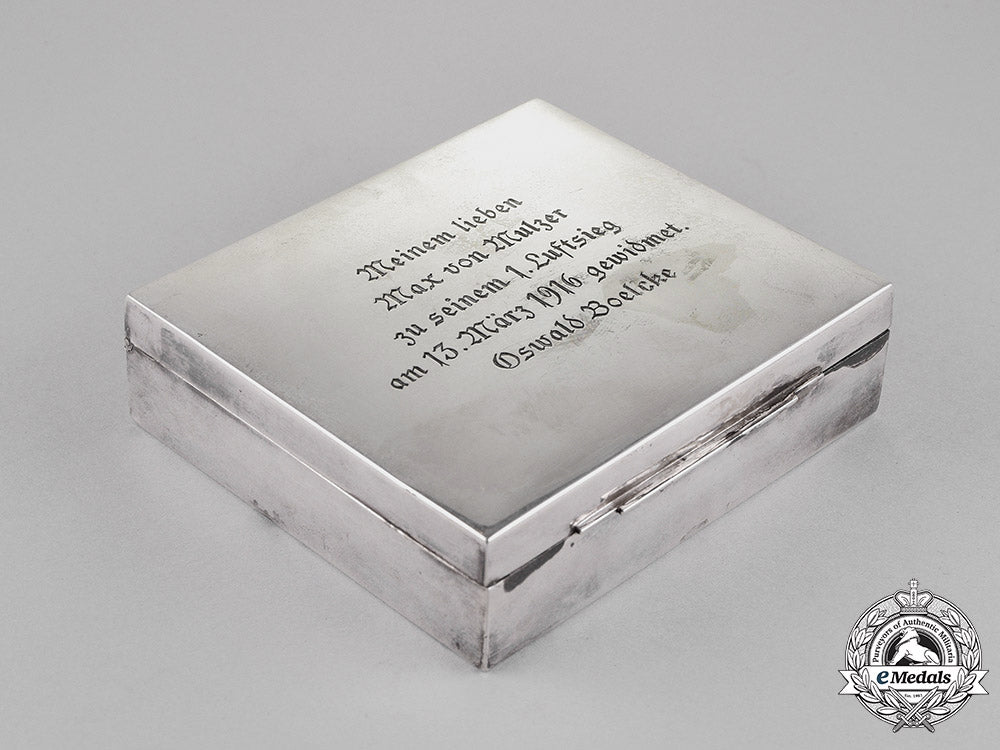
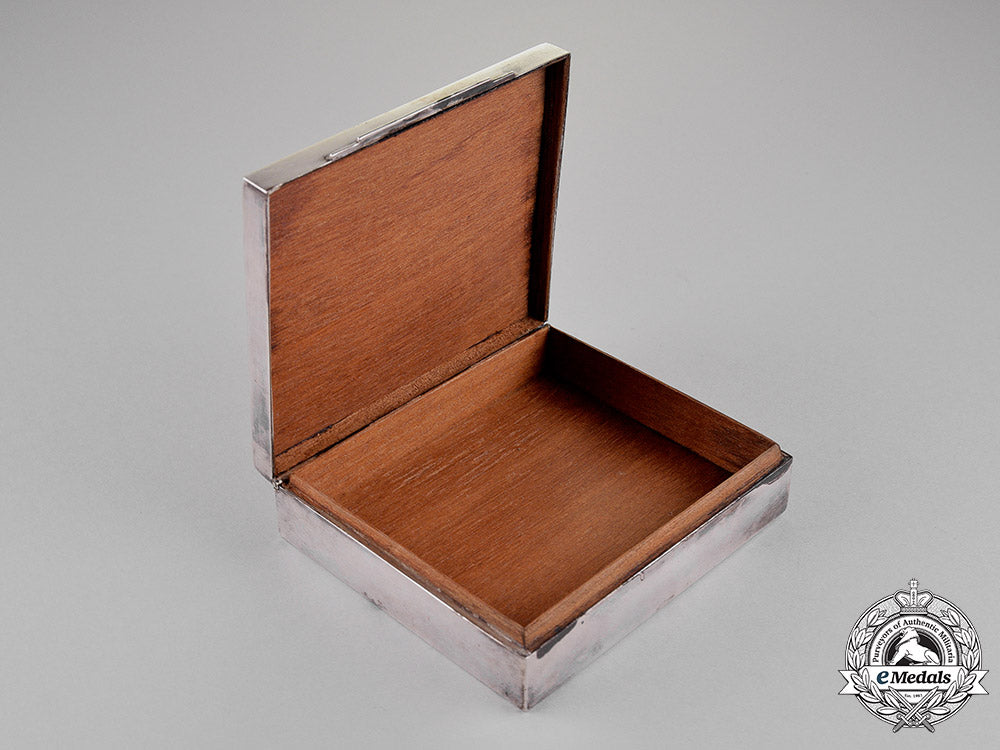
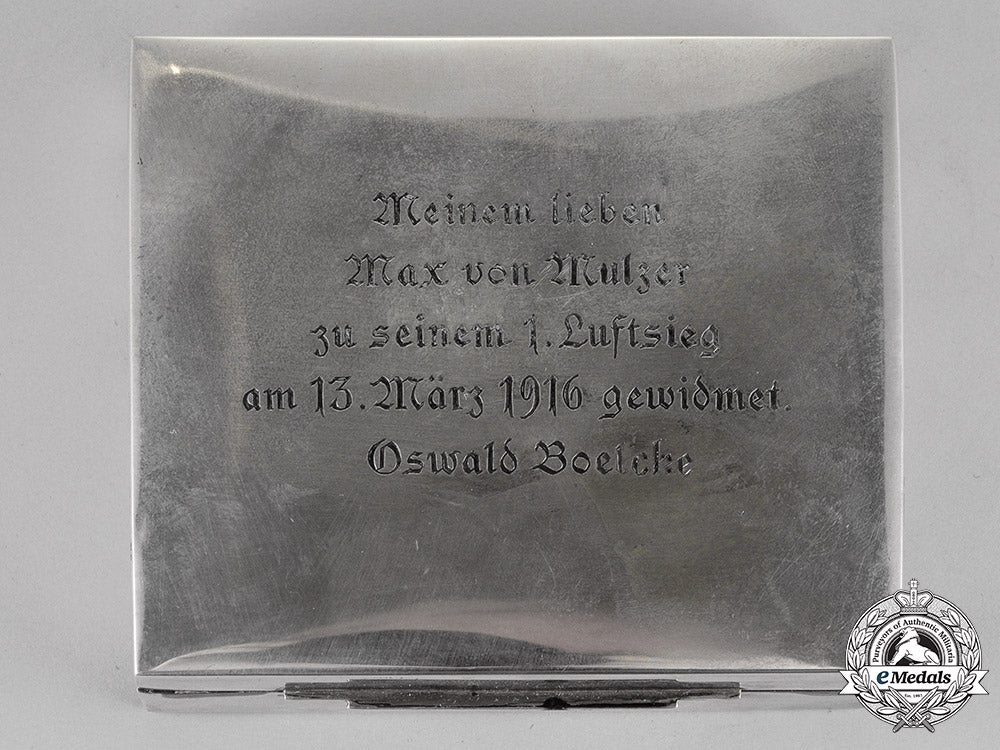
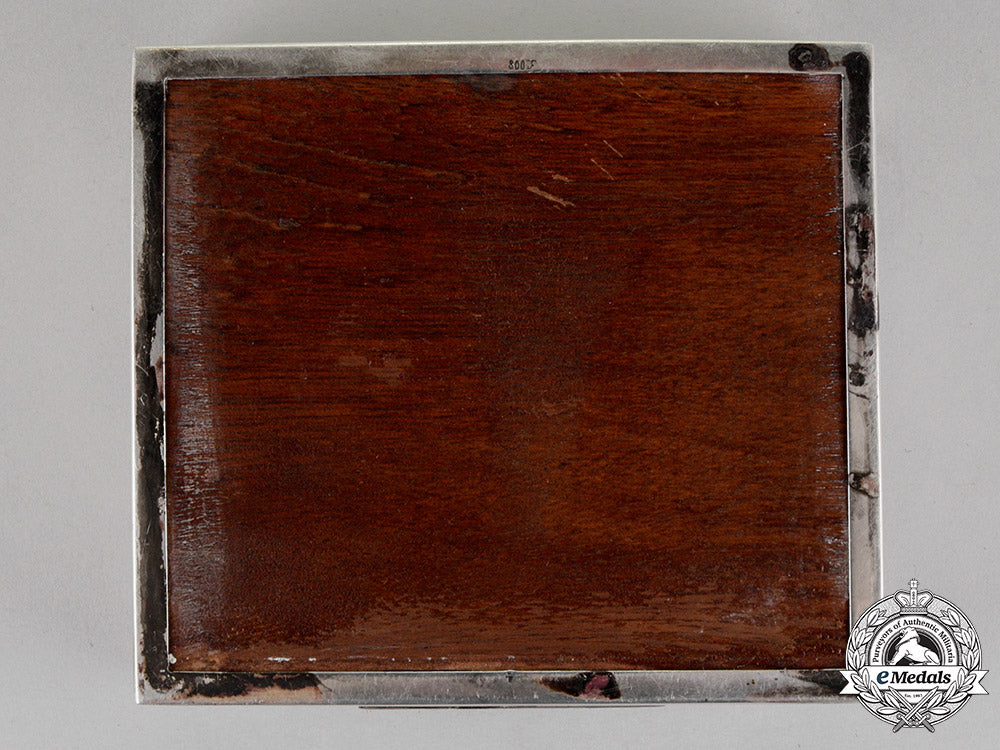
You May Also Like
Japan, Empire. A T90 Civil Defense Helmet, c.1943
W8287
Canada, CEF. A Large Oval Photo
C7175
International. A Lot of Five Medals & Badges
M0685-9
Italy, Kingdom. An Order of St. Maurice and St. Lazarus, c.1900
EU23629
Spain, Kingdom. A Royal and Military Order of St. Hermenegildo, Grand Cross Star, c.1880
EU23630
-
Japan, Empire. A T90 Civil Defense Helmet, c.1943
W8287
Add to CartRegular price $275 USDRegular price $0 USD Sale price $275 USDUnit price / per -
Canada, CEF. A Large Oval Photo
C7175
Add to CartRegular price $120 USDRegular price $0 USD Sale price $120 USDUnit price / per -
International. A Lot of Five Medals & Badges
M0685-9
Add to CartRegular price $200 USDRegular price $0 USD Sale price $200 USDUnit price / per -
Italy, Kingdom. An Order of St. Maurice and St. Lazarus, c.1900
EU23629
Add to CartRegular price $375 USDRegular price $0 USD Sale price $375 USDUnit price / per -
Spain, Kingdom. A Royal and Military Order of St. Hermenegildo, Grand Cross Star, c.1880
EU23630
Add to CartRegular price $685 USDRegular price $0 USD Sale price $685 USDUnit price / per
Do you have a similar item you are interested in selling?
Please complete the form and our client care representatives will contact you.
Sell Item












